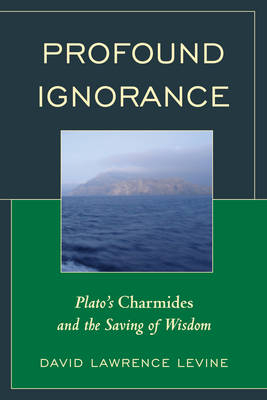
Profound Ignorance
Plato's Charmides and the Saving of Wisdom
Seiten
2017
Lexington Books (Verlag)
978-1-4985-0178-1 (ISBN)
Lexington Books (Verlag)
978-1-4985-0178-1 (ISBN)
No topic could be more relevant in these times than tyranny, “the greatest sickness of the soul.” The Charmides of Plato gives us an opportunity to look deeply into the soul or cognitive structure of one of Athens’s most notorious tyrants, Critias, and looks deeply into its dialectical opposite, the soul and cognitive structure of Socrates.
Returning from the battle of Potidaea, Socrates reenters the city only to find it changed, with new leadership in the making. Socrates assumes the mask of physician in order to diagnose the city’s condition in the persons of the young and charismatic Charmides and his ambitious and formidable guardian Critias. Beneath the cloak of their self-presentations, Doctor Socrates discovers a profound and communicable disease: their incipient tyranny, “the greatest sickness of the soul.” He thereby is able to “foresee” their future and their role in the oligarchy (The Thirty Tyrants) that overthrows the democracy at the end of the Peloponnesian War.
The unusual diagnostic instrument of this physician of the city: the question of sophrosyne (customarily translated as moderation). The analysis of the soul of this popular favorite uncovers a distorted development with little prospect of self-knowledge, and that of the guardian, a profound disabling ignorance, deluded and perverted by his presumed practical wisdom. Alongside on the bench sits Socrates whose ignorance, by contrast, shows itself to be enabling, measured and prospective. In this way, the profound ignorance of the tyrant and the profound ignorance of the philosopher are made to mutually illuminate one another.
In the process, Levine brings us to see Plato’s extended apologia or defense of Socrates as “a teacher of tyrants” and his counter-indictment of the city for its unthinking acceptance of its leaders. Moreover, in the face of modern skepticism, we are brought to see how such “value judgments” are possible, how Plato conceives the prospects for practical judgment (phronȇsis). In addition we witness the care with which Plato presents his penetrating diagnoses even amidst compromised circumstances. Levine, further, is at pains to situate the specific dialogic issues in their larger significance for the philosophic tradition. Lastly, the author’s inviting style encourages the reader to think along with Socrates.
The question of tyranny is always relevant. The question of our ignorance is always immediate. The conversation about sophrosyne needs to be resumed.
Returning from the battle of Potidaea, Socrates reenters the city only to find it changed, with new leadership in the making. Socrates assumes the mask of physician in order to diagnose the city’s condition in the persons of the young and charismatic Charmides and his ambitious and formidable guardian Critias. Beneath the cloak of their self-presentations, Doctor Socrates discovers a profound and communicable disease: their incipient tyranny, “the greatest sickness of the soul.” He thereby is able to “foresee” their future and their role in the oligarchy (The Thirty Tyrants) that overthrows the democracy at the end of the Peloponnesian War.
The unusual diagnostic instrument of this physician of the city: the question of sophrosyne (customarily translated as moderation). The analysis of the soul of this popular favorite uncovers a distorted development with little prospect of self-knowledge, and that of the guardian, a profound disabling ignorance, deluded and perverted by his presumed practical wisdom. Alongside on the bench sits Socrates whose ignorance, by contrast, shows itself to be enabling, measured and prospective. In this way, the profound ignorance of the tyrant and the profound ignorance of the philosopher are made to mutually illuminate one another.
In the process, Levine brings us to see Plato’s extended apologia or defense of Socrates as “a teacher of tyrants” and his counter-indictment of the city for its unthinking acceptance of its leaders. Moreover, in the face of modern skepticism, we are brought to see how such “value judgments” are possible, how Plato conceives the prospects for practical judgment (phronȇsis). In addition we witness the care with which Plato presents his penetrating diagnoses even amidst compromised circumstances. Levine, further, is at pains to situate the specific dialogic issues in their larger significance for the philosophic tradition. Lastly, the author’s inviting style encourages the reader to think along with Socrates.
The question of tyranny is always relevant. The question of our ignorance is always immediate. The conversation about sophrosyne needs to be resumed.
David Levine was a tutor at St. John's College, Santa Fe, for twenty-seven years.
Chapter One: Remembering the Tyrant in the Age of Totalitarianism: A General Introduction
Chapter Two: The City and Its Promise (153a1-155a8)
Chapter Three: Doctor Socrates (155a8-158c4)
Chapter Four: The Look Beneath, Part One: The Dilemma of Our Sociability (155c5-160d4)
Chapter Five: The Look Beneath, Part II: The Elusiveness of Selfhood (160d5-162b11)
Chapter Six: The Wisdom of Critias (162c1-166c5)
Chapter Seven: The Lesson of Ignorance, I (166c6-167a8)
Chapter Eight: The Lesson of Ignorance, II (167a9-169d8)
Chapter Nine: Horn or Ivory, The Two Faces of Sophrosyne (169d9-175d3)
Chapter Ten: “A Sight Surely Worth Seeing” (175d4-176d5)
Appendix: Synopsis
| Erscheinungsdatum | 10.05.2021 |
|---|---|
| Verlagsort | Lanham, MD |
| Sprache | englisch |
| Maße | 153 x 230 mm |
| Gewicht | 553 g |
| Themenwelt | Geisteswissenschaften ► Philosophie ► Erkenntnistheorie / Wissenschaftstheorie |
| Geisteswissenschaften ► Philosophie ► Ethik | |
| Geisteswissenschaften ► Philosophie ► Philosophie Altertum / Antike | |
| ISBN-10 | 1-4985-0178-8 / 1498501788 |
| ISBN-13 | 978-1-4985-0178-1 / 9781498501781 |
| Zustand | Neuware |
| Haben Sie eine Frage zum Produkt? |
Mehr entdecken
aus dem Bereich
aus dem Bereich
die Grundlegung der modernen Philosophie
Buch | Softcover (2023)
C.H.Beck (Verlag)
18,00 €
Buch | Softcover (2023)
Reclam, Philipp (Verlag)
7,00 €

![Was heißt Denken?. Vorlesung Wintersemester 1951/52. [Was bedeutet das alles?] - Martin Heidegger](/media/113619842)
